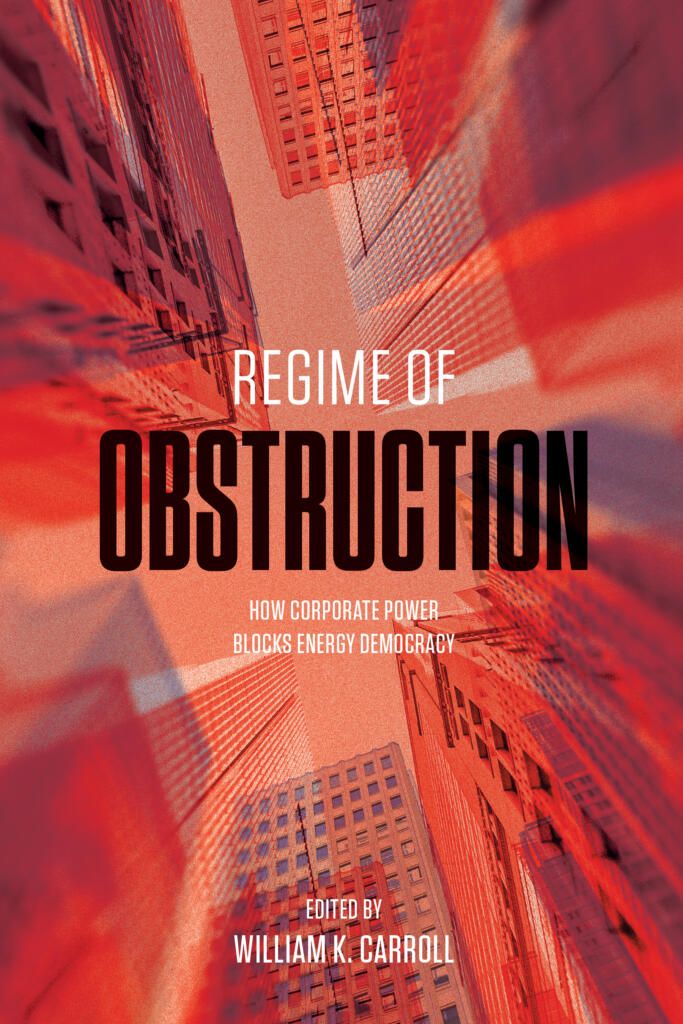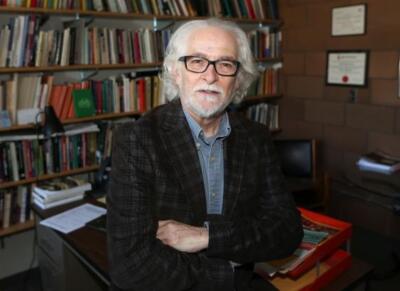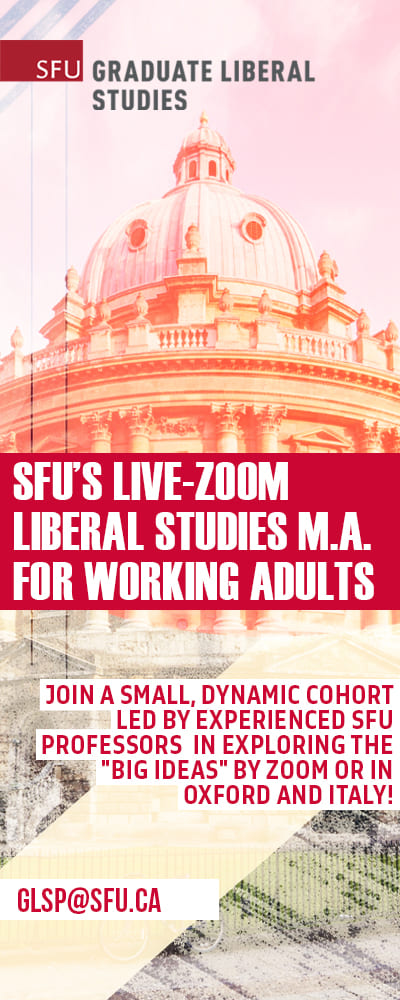Matters of conscience
Regime of Obstruction
by William K. Carroll (ed.)
Athabasca University Press, 2021
$39.99 / 9781771992893
A Strategic Nature: Public Relations and The Politics of American Environmentalism
by Melissa Aronczyk and Maria I. Espinoza
Don Mills: Oxford University Press – Canada, 2022
$108.95 / 9780190055349
The New Corporation: How “Good” Corporations Are Bad for Democracy
by Joel Bakan
Toronto: Allen Lane, 2020
$19.95 / 9780735238848
Reviewed by Loys Maingon
*

These are three books made particularly relevant by the greatest greenwash show on Earth that was COP28 at Dubai. If there lingered until now a sense that government institutions still represented the interests of ordinary people or the planet, it has now vanished. COP28 with its 97,000 registrants and 2,500 oil and gas lobbyists was a culmination of three decades of corporate investment in controlling and shaping the message that we can manage climate change and continue to promote social and environmental policies that further the interests of business-as-usual. These books are about the game plan to limit the damaging message of science, and how that plan unfolds to suppress democracy. Theirs is a complex message because they are analyses of how markets shape our everyday preconceptions and socially-constructed perceptions. It is all about our immersion in a market flow of information that keeps us compliant to corporate messaging and subverts any semblance of democracy both in Canada and globally.
The IPCC (Intergovernmental Panel on Climate Change) report released in February 2022 detailed the extreme predicament that we face as thirty years of failed climate leadership has either brought ecosystems to the brink or ignored their irreversible crossings. It is not just a “catalogue of human miseries,” which we and future generations will experience as Antonio Guterres aptly called it, it was the first IPCC report to overtly acknowledge the oil industry’s participation in the IPCC from its very beginnings in the 1980s, and its deliberate role in fabricating and spreading the disinformation, greenwashing and maladaptation that has now brought us to the brink. What is not clear to most commentators is the pervasiveness of this corruption throughout all of our cultural institutions. We tacitly assume corruption to be normal, or even a respectable expression of corporate “professionalism.”

The new, more honest, take on the political constraints that have obstructed and warped self-evident science for decades comes from the fact that this United Nations report was the first to incorporate sociological data, of the kind marshaled by William Carroll et al. Regime of Obstruction documents the corruption of Canadian democracy that has become characteristic of our governmental systems, corporate regimes, and even the environmental organizations that have collaborated in the greening of the business ethos. We need not look too far. BC’s NDP premier John Horgan proudly touted his government’s 50% partnership with Shell Oil Ltd. in the new BC Centre for Innovation and Clean Energy BC Centre for Innovation and Clean Energy for technological innovation and carbon capture.1 Why not? After all, Shell Oil Ltd. sits on the board of BC’s Climate Solutions Council. Even back in 2017, BC’s climate plan was already criticized for being written by Shell Oil.2 BC’s chosen industry partner had just lost a major lawsuit for climate disinformation and was being investigated by Congress.3 That had no impact on their importance to John Horgan and David Eby. Shell was part of “their team.” That is just considered normal, “good business,” even for social democrats.

The depth of the corruption should surprise no one – unless they are so immersed in it that it has become their natural ecosystem and can no longer tell sewage from spring water. Amy Westervelt recently wrote an excellent article on this, drawing from the recent work of Melissa Aronczyk and Maria I. Espinosa, A Strategic Nature: Public Relations and The Politics of American Environmentalism, which is fast becoming a must-read for anyone interested in understanding the history of Big Oil’s corruption and co-option of even the environmental movement and climate policy makers.4 As Westervelt correctly notes, the general official ineptitude that has guided – and continues to guide – official climate policy over the last thirty years in an effort to maintain status quo would have been impossible were it not for the tacit collusion of universities in promoting short-sighted maladapted climate solutions that benefit only a privileged sector of society:
The report’s authors did not draw a connection between misinformation and maladaptation, opting instead to assert that maladaptation is often unintended. Yet an increasing number of peer-reviewed studies point to the fossil-fuel industry’s fingerprints on that particular problem as well, thanks to the role it plays as a primary funder of university research on not only climate science, but also policy and economics. As well as its penchant for greenwashing solutions that don’t work, or that work only for a few.5

Joel Bakan’s The New Corporation: How “Good” Corporations Are Bad for Democracy, and William Carroll’s Regime of Obstruction are important books for readers who wish to come to grips with the disinformation and social engineering practices that are ingrained in our every-day lives and blind us to the manipulation of information. Bakan’s work is a real breath of fresh air in the academic world which is dominated by business schools, corporate funding, and legions of corporate administrators. In that respect, serious readers should first avail themselves of Aronczyk and Espinosa’s work which provides an in-depth overview of the history public relations as a “legitimizing” tool of corporate America in its efforts to control social discourse and shape public perceptions. Subtle public relations disinformation is so pervasive that it has systematically co-opted the environmental movement and blurred the distinction between science and corporate advertising.

For public relations, truth is not about facts. It is about creating convincing alternative narratives to be espoused by a majority of the public and the politicians it elects, over and over again. A professional communicator creates truths that corrode democracy by appealing to apparent democratic sentiments. Everything that Carroll et al. identify in the mechanics of obstruction in Canadian politics is inherent in all facets of the world of corporate public relations practices, whether they be in oil, finance, forestry, or the industrial chemical industry. As Bakan correctly notes, this is simply the psychotic corporate world always prioritizing and protecting its financial interests above the public interest, by convincing the public that corporate interest is synonymous with public interest. The belief that Trumpism makes America great is just the ideology that what is good for GM is good for America marketed to a logical conclusion. Aronczyk and Espinosa summarize these ingrained practices, which are now taken for granted and even pass for respectable “professionalism,” but which, as they document, were until recently the stuff of Congressional criminal investigations:
These skills and techniques will be familiar to the reader: they appear in these pages as the product of the last 100 years of PR’s progress. Creating coalitions of support across state and local-level organizations; mobilizing third-party “grassroots” advocates, such as employees of your organization, to speak on your behalf; crafting data points and statistics to factualize persuasive narratives; extensive media monitoring and tracking of opposing groups’ public presence; pro-energy and economic growth (and anti-regulatory) information and influence campaigns; scenario planning to anticipate problems before they start; public events designed for promotional purposes.6
What was once criminal now passes for respectable and above reproach.

How criminality became acceptable and praiseworthy is cleverly traced by Aronczyk and Espinoza by tracking the rise and success of corporate “public relations” as a tool intent on misleading the public from 1918 to 1962. As they argue the rise of modern environmentalism that came in the wake of Rachel Carson’s Silent Spring in 1962, broke the hold that that the chemical industry had on the public understanding of science. While the initial reaction of industry to dismiss Carson failed, by the end of the sixties and particularly after the enactment of the Clean Air Act, The Species at Risk Act, and the National Environmental Policy Act in the early 1970s, the industry regrouped and brought its messaging in line with environmental trends. In the process, corporations “greened.” They became the biggest funders of environmental organizations, often sitting prominently on the boards of environmental organizations, effectively placing themselves in a position to control messaging and sending the message that they could work with their detractors. Hence, the public perception that the way for environmentalist to meet their objectives was to work with governments and corporations. “Smart environmentalism” befriends and works with governments and corporations. They get things done if you are willing to compromise. It is a collaborationist illusion. As the outcomes fifty years on should indicate, the sweet belief that you get more with honey has proven to be just a honey trap. Environmental collusion with corporations may get environmentalists the Order of BC, but in the end the forests and the planet continue to be degraded.
Climate change is both a scientific and a social problem. While its scientific or technical dimension is treated as an externality to our daily lives, its social dimension is even more so tacitly overlooked, because it is at odds with our dominant ideological filter: neoliberalism. This is what makes these books such awkward reading. The readers constantly need to adjust their assumptions. Mainstream political parties and the media that support corporations unquestioningly endorse the essential tenets of neoliberalism and the consequent rise of authoritarianism. Most people are blissfully unaware of the political, economic, and ideological forces that drive climate change, just as most Americans are reportedly unaware of the ongoing threats to their democracy.7 The threats to democracy and social justice are in fact coextensive with the threats of climate change because both are part of the politics of energy and finance that underlie the global hegemony of corporations which control the flow of information, as Carroll’s work illustrates in great detail.

Like boiling frogs in the climate change soup, it is difficult for participants in a corporate society to conceive of the ideological power that capitalism has on our self-image and our sense of normality. What Bakan and Carroll present in these two analyses of the capitalist system’s links to climate change is akin to Dr. Eric Williams’ controversial and socially unacceptable thesis Capitalism and Slavery, presented in 1938 at Oxford. Williams’ thesis took 84 years to become academically respectable and to be published in Britain. It offended even the most progressive academic circles to consider that “Slavery was abolished in much of the British empire in 1833 because doing so at the time was in Britain’s economic self-interest, not because Britain suddenly discovered a conscience.” The power of the capitalist ideology is such that slavery was only terminated by compensating unscrupulous profiteers with Britain’s biggest debt (40% of the 1833 national budget). The debt which ordinary taxpayers covered was only retired in 2015! Over the last 180 years wealthy former slave-owning families and corporations have continued to profit from human misery in all respectability. The moral of this sad historical lesson is that similarly, fossil fuels and the climate change they drive will only be abolished when it is in the self-interest of the global capitalist culture, and corporations benefit thereby. And that too will undoubtedly be at the expense of ordinary taxpayers.
For the most part this system is sustained by the intellectual lethargy and subservience of the talking classes, the present writer included. As noted by Stevenson and Simon:“there seems to have been little effort so far at think tanks, professional military institutions and universities to build and contemplate the dire scenarios that have become increasingly plausible.”8 Bakan and Caroll present rare exceptions to the rule in their analyses of the links between the strategies used by corporations to maintain “business-as-usual” and our collective inability to address climate change and the existential threats it poses to democracy and life on this planet.
In its triple adumbrations (climate, biodiversity, and desertification emergencies) climate change is driven by financial interests which constrain and undermine social justice and democracy. To understand why climate scientists and activists identify with the realism of the plot of the recent eco-satire Don’t Look Up which film critics have panned, one has to be aware of the complex, if not simply duplicitous, and deliberately secretive political role that the corporate world plays in every aspect of our daily lives.9 This may seem offensive and uncomfortable for most people to contemplate, but like Ockham’s razor it is the simplest explanation of our collective inability to respond effectively to the climate emergency for the past fifty years. This was plain for everybody to witness in Glasgow at the closing of COP26 where politicians reversed agreements after failing to obtain permission from coal lobbyists.10
Reading both Carroll and Bakan should compel the readers to ask some uncomfortable questions. Do we simply live in a healthy society threatened by a regime of corporate obstruction and distraction as Carroll contents, or do we live in a psychopathic society dominated by psychopathic corporations as Bakan contends? These are two essential Janus questions posed by these two excellent books on the power that corporations exercise in shaping all levels of contemporary society and the policies that inform government decisions and practices. It is a portrait of the marginalization of governments which no longer represent the public interest, but the corporate interest masquerading as public interest. Not to ask oneself these two inconvenient questions is complacency. It is merely to acquiesce to, or passively encourage, the rise of fascism which we are now witnessing in North America and Europe, and the collapse of the left morphed into the odious venial conservatism of a benighted Sir Tony Blair and his social-democrat counterparts across the world.11
As we watch democracy being inexorably eroded in the United States and globally, wherever neoliberal economics have predominated and information technology has grown unquestioned for the past forty years, these two questions overlap one another. Perhaps there is nothing quite so urgent to consider now that AI emerges as a new all-pervasive information and social control tool. There is only a shade of difference, important though it may be, between these two questions, as there is between these two books. The extent of the difference depends on the degree to which the narrator’s social position causes him or her to be, however unconsciously, party to what is perceived to be either a simple system of “obstruction,” or a more nuanced and complex “psychopathy.” In a world in which “the economy” has become so central to our lives and ways of reasoning, the influence of corporations controls the economy, shapes our communities, our educational and cultural systems, and the very ways in which individuals think about themselves and evaluate other beings and the world about us.
In both instances, the authors are concerned with the impact of corporations on the climate crisis and democracy. Corporate messaging, particularly when it presents itself as “part of the solution” as it did at COP28, constitutes a predominant obstacle to making the kinds of social and economic transformative changes which scientists have called for with increasing urgency for the last decade. The essays in Carroll’s Regime of Obstruction are a set of research findings based on the first three years (2015-1018) of a seven-year SSHRC project: “Mapping the Power of the Carbon-Extractive Corporate Resource Sector.” The immediate problem of course lies in what is meant by “transformative change.”

As Arne Naess argued in the early 1970s, environmentalism is always either shallow, or superficial, or deep. Corporate environmentalism lies by definition with the 90% which is shallow. Climate change which science argues is also a biodiversity crisis urges us to make deeper commitments to the preservation of nature. The divide lies in the depth of our commitment to nature. For they who see nature as just resources for the economy, the commitment is always shallow and “transformative change” needs only be greenwash compatible with corporate interests.
Regime of Obstruction maps the strategies used by Canada’s fossil fuel industry to infiltrate and influence government and civil society in order to further its interests and prevent transformative change. The first part of the book maps in five essays the who’s who of Canadian corporate power and how the corridors of power are connected to maintain status quo. As Mark Hobson’s eloquent essay “Landscape of Risk” argues, the same corporations which for decades publicly denied the reality of climate change have developed a strategy of “New Denialism.” The new strategy is not to deny atmospheric science, which everybody now experiences, but to question its urgency in order to control and deny what the science implies for public policy and where possible to exploit the market opportunities. This was exactly the strategy used by Sultan al Jaber at COP28 when he publicly claimed, to the astonishment of the scientific community, that there was no science behind phasing out fossil fuels.12

New Denialism is a new way of reframing the problem that climate change poses for “business as usual” to present itself in a new mimetic environmentally-friendly light. As Marc Lee correctly observes in an essay that every politician and school child should read (From Clean growth to Climate Justice) the newly minted term “clean growth” so enthusiastically endorsed by Justin Trudeau and John Horgan as of 2015 is no more than just a promise of lowered emissions. As with climate commitments that have never been met in thirty years, clean growth has the value of a political promise. It is a celebrated, if vacuous, buzz word in the leading fossil fuel polluting provinces of British Columbia and Alberta with its homonym “climate leadership.”
“Leadership” does not mean being paid to endorse a public office or title. It means doing the difficult work of engaging the public in a difficult conversation about facts, and what growth really costs both socially and ecologically. “Clean-growth” is just more Orwellian doublespeak at its finest. It is simply, as Lee bluntly argues, the rebranding of dirty activities that are considered to be essential for the well-being of the Canadian economy: oil sands, and fracking. Paradoxically, it leads to the “expansion of oil sands and fracked gas production, accompanied by new bitumen pipelines and LNG terminals.” Climate leadership which has been so enthusiastically endorsed by BC’s NDP government only exacerbates the climate emergency. It shamefully betrays social democratic values of climate justice, because it perpetuates a system of maldistribution responsible for social and ecological degradation. The corporate success of the Coastal Gaslink pipeline pushed by both the provincial and federal governments which has resulted in hundreds of environmental violations destroying salmon creeks and which culminated in the release of a damning Amnesty International report defines what “climate leadership” really means.13
The social focus on the short-term economic benefits of growth enables governments and corporations to dodge the demands of environmental and social justice. The classical problem of growth and why its endorsement is inconsistent with the social justice aspirations of would-be progressives is well summarized by Lee: “economic growth – through both increased population and increased consumption per capita – has been directly correlated with the use of fossil fuel energy and thus growing carbon emissions. In addition, a narrow focus on carbon emissions neglects other serious ecological challenges, including waste, environmental degradation, and a loss of biodiversity and the extinction of entire species.” Climate justice recognizes a priori the holistic nature of the problem. An economy that favours the top 20 percent of Canadians who control 67% of the wealth and socializes the cost of their carbon footprint on the lower 40 percent who own 2 percent of the wealth, merely perpetuates an exploitive system of inequity. To address climate change, systemic economic change is needed which would hold the fossil fuel industry accountable.
Bakan takes a global perspective that focuses on the illusions created by the “New Corporation” movement and the “greening” of the corporate economic system that sucks in even the NGOs and universities who are financed by and serve the interests of their corporate paymasters. It is a kaleidoscopic view of the machinations of the corporate world and banks to create a shallow mimetic green world that works to convince the public that governments that have failed them before, are also incapable of rising to the challenges posed by the global crises we face and need to be replaced by corporate leadership. The corporate world sells the misleading message that governments are part of the problem and cannot be the solution. The message of the New Corporation movement is that: “we don’t need government anymore, because socially responsible corporations will fill the void.”

If this sounds far-fetched, we need only consider the performance of Mark Carney and the fossil industry at COP26 in Glasgow where he laid the groundwork for the greenwash of COP28. At COP26, Carney announced the creation of the Glasgow Financial Alliance for Net Zero (GFANZ), which was supposed to make green carbon neutral investment a priority in order to transition away from fossil fuels.14 The $130 trillion US that Carney claimed was committed never actually materialized. Oil and gas production since COP26 has been financed by the same GFANZ institutions, and since then both profits and production have only increased. Carney himself went on to further his would-be-green credentials by joining the board of Brookfield Asset Management, a company that claims to be “net-zero” and yet invests millions in coal ports and oil sands.15
Bakan draws on the work of the political scientist Wendy Brown (UC Berkeley) on the “economization” of every aspect of contemporary human thinking: “the soaking into everything of economic values, a quiet and slow invasion into all different cells of life.”16 Corporate thinking pervades the human psyche to the extent that “increasingly human beings also understand themselves as bits of capital, needing to attract investors and invest in themselves wisely.” Absurd and unsettling as it may seem, this is the modern dogma of “professionalism” essential to successful corporate, government, and academic careers. In a society in which corporate and government interests become indistinguishable, social fitness is compliance to the corporate mold.
For historians, this is nothing more than another adumbration of corporatism, the ideology that gave rise to fascist totalitarianism, whose return we logically witness today in the rise of the right in America and Europe. As Bakan and Brown note, the economization of the world by corporate disinformation threatens the democratic foundations of the Enlightenment which “promised us freedom on the basis of being able to think for ourselves and thus govern ourselves.”

Furthering the central thesis of his award-winning 2004 book and documentary The Corporation: The Pathological Pursuit of Profit and Power, which made the case that corporations are essentially psychopathic entities, Bakan reviews the hollowness of the current trendy world of the “New Corporation” that grew out of the 2008 economic meltdown. The New Corporation is the socially mimetic organization of business that projects and seeks the image of benevolent green, environmentally responsible corporate citizenry to a willing public of consumers. It is a mimetic response to the growing crisis of the environment and an increasingly co-opted environmental movement.
This is the ideology that has made possible, and has been exploited by, the current crop of “corporate titans” such as Bill Gates, Elon Musk, and Jeff Bezos. It found a kind of apotheosis in the United Nations’ COP28 in Dubai, where under the leadership of an oil executive, some 2,500 oil and gas lobbyists met 95,000 participants and claimed to solve climate change by a scam system of economic offsets and untested space-age technologies. The New Corporation sells the illusion of socially-responsible environmental business practices while furthering the environmentally destructive cornucopian interests of business-as-usual. It is the slick misdirection of every huckster. It tells us at our tax expenses what to look at to feel good, while the unpleasant environmental destruction of this planet continues. It is the perfect marriage of corporate interests and the slick green environmentalism of the respectable “environmental organizations” only too willing to work with and within governments and corporations, as though governments and corporations were really distinct.
Corporations devise policies and communication strategies to further their interests which are rarely, if ever, benevolent. The aim is to hijack government. As Bakan reiterates from his 2004 thesis, corporations are legally obliged to protect the interests of “the corporation.” As such their priority is anti-social. They are legally obliged to do well; they can only do good if it serves the ulterior motive to do financially well. That is where the rub lies. As noted above with regards to Dr. Eric Williams thesis: “Slavery was abolished in much of the British empire in 1833 because doing so at the time was in Britain’s economic self-interest,” climate change will also be addressed when it will be in the corporate world’s self-interest. That interest appears to be political.
The ultimate goal of corporations is not manufacture or sales, it is the political power to control the market and market conditions. Geoffroy Supran and Naomi Oreske have documented the disinformation campaign which the fossil fuel industry has led against climate change dating back to the early sixties.17 Their survey of the sixty-year campaign illustrates how deeply-ingrained corporate thinking is in contemporary society and its cultures. The power of disinformation campaigns and social engineering lies largely in the overbearing social desire to comply and conform, even as we pretend to think critically.

One of the most remarkable things about the crises or emergencies that twenty-first society faces is our collective very willful endorsement of the lies we are told by governments, corporations, universities, and NGOs alike. We set aside the inconvenience of reason’s scalpel and trade it for the blunt palette knife of Orwellian “critical thinking” that is rarely critical but always socially conforming. In their analyses, Bakan, Carroll, Aronczyk, and Espinoza provide important insights into the social mechanics of disinformation and social engineering. They give us a glimpse into the web of corporate deceit that has brought both humanity and the planet to an existential brink, as others such as David Attenborough and Antonio Guterres have over the last years taken to repeat.
These books are important. These are in fact “transformative texts,” because they liberate us from the corporate Wizard of Oz that holds the world in trance. While they do not present solutions or pathways out of the predicament that humanity now faces, they articulate a complex understanding of the root problems that beset us and future generations. In a world that has become used to despair and the proclamation that these are insoluble “wicked problems,” the analysis of complex social disinformation opens avenues to make the intractable tractable again by simple reason. There are no insoluble problems, only social pretexts and cultural hypocrisies not to solve problems. The more entrenched we are in our social lies the more easily we become convinced by the socio-economic lies behind the fiction of “wicked problems.” Understanding our relationship to corporate disinformation and social engineering is an essential step away from a collective corporate psychopathy that breaks the spell –and for that we should thank Bakan, Carrroll, Aronczyk, and Espinoza.
- https://thetyee.ca/Opinion/2017/09/18/Big-Oil-Gas-Shaped-BC-Climate-Plan/ ; https://bc.ctvnews.ca/b-c-s-climate-plan-written-in-oil-industry-boardroom-documents-1.359481 ↩︎
- https://thetyee.ca/Opinion/2017/09/18/Big-Oil-Gas-Shaped-BC-Climate-Plan/ ; https://bc.ctvnews.ca/b-c-s-climate-plan-written-in-oil-industry-boardroom-documents-1.359481 ↩︎
- https://www.forbes.com/sites/davidrvetter/2021/05/26/shell-oil-verdict-could-trigger-a-wave-of-climate-litigation-against-big-polluters/?sh=21b214401a79
↩︎ - https://global.oup.com/academic/product/a-strategic-nature-9780190055356?cc=us&lang=en&# ↩︎
- Amy Westervelt, “Our climate solutions are failing – and Big Oil’s fingerprints are all over them.” The Guardian (7 March 2022). https://www.theguardian.com/commentisfree/2022/mar/07/climate-solutions-big-oil-ipcc-report ↩︎
- Melissa Aronczyk and Maria I Espinoza (2022) A Strategic Nature: Public Relations and the Politics of American Environmentalism. Oxford, p.213. ↩︎
- https://www.nytimes.com/2022/01/13/opinion/january-6-civil-war.html ↩︎
- https://www.nytimes.com/2022/01/13/opinion/january-6-civil-war.html ↩︎
- https://www.theguardian.com/film/2022/jan/08/dont-look-up-four-climate-experts-on-the-polarising-disaster-film ↩︎
- https://www.theguardian.com/environment/2021/nov/13/cop26-countries-agree-to-accept-imperfect-climate-agreement ↩︎
- https://www.theguardian.com/commentisfree/2022/jan/07/labour-tony-blair-prime-minister-grassroots ↩︎
- https://www.theguardian.com/environment/live/2023/dec/04/cop28-backlash-after-president-claims-no-science-behind-fossil-fuel-phase-out ↩︎
- https://amnesty.ca/press-releases/wetsuweten-report-2023/; https://www.cbc.ca/news/canada/british-columbia/coastal-gaslink-fully-installed-1.7013274; https://thenarwhal.ca/bc-coastal-gaslink-sediment-spills/ ↩︎
- https://www.cbc.ca/news/world/cop26-130-trillion-net-zero-gfanz-1.6235060 ↩︎
- https://unearthed.greenpeace.org/2021/02/26/mark-carney-brookfield-net-zero-cop-fossil-fuel-coal-oil-gas/ ↩︎
- The New Corporation, p.10 ↩︎
- https://www.theguardian.com/environment/2021/nov/18/the-forgotten-oil-ads-that-told-us-climate-change-was-nothing ↩︎
*

A graduate of the universities of St. Andrews, UBC, and Saskatchewan, Dr. Loys Maingon first taught environmental studies in 1986. An avid naturalist and a registered professional biologist, he is past president of the Comox Valley Naturalists and current webinar host for the Canadian Society of Environmental Biologists. From his home on the Tsolum River near Merville, he owns and operates an endangered plant nursery and oversees a number of regional conservation and heritage programmes. He is also Research Director of the Strathcona Wilderness Institute and does environmental consulting. Arrested at Clayoquot Sound in 1993, Loys remains a strong advocate for social, economic, and environmental change. He contributed a chapter to Clayoquot & Dissent (Ronsdale Press: 1994), and authored Field Guide to Basic Lichens of Strathcona Park (Strathcona Wilderness Institute Press: 2022).
Editor’s note: For The British Columbia Review, Loys Maingon has reviewed books by Philippe D. Tortell (editor), Daniel Pauly, Collin Varner, Peter Wohlleben (The Secret Wisdom of Nature and The Hidden Life of Trees), and Paula Wild.
*
The British Columbia Review
Interim Editors, 2023-24: Trevor Marc Hughes (non-fiction), Brett Josef Grubisic (fiction)
Publisher: Richard Mackie
Formerly The Ormsby Review, The British Columbia Review is an on-line book review and journal service for BC writers and readers. The Advisory Board now consists of Jean Barman, Wade Davis, Robin Fisher, Barry Gough, Hugh Johnston, Kathy Mezei, Patricia Roy, Maria Tippett, and Graeme Wynn. Provincial Government Patron (since September 2018): Creative BC. Honorary Patron: Yosef Wosk. Scholarly Patron: SFU Graduate Liberal Studies. The British Columbia Review was founded in 2016 by Richard Mackie and Alan Twigg.
“Only connect.” – E.M. Forster































4 comments on “Matters of conscience”